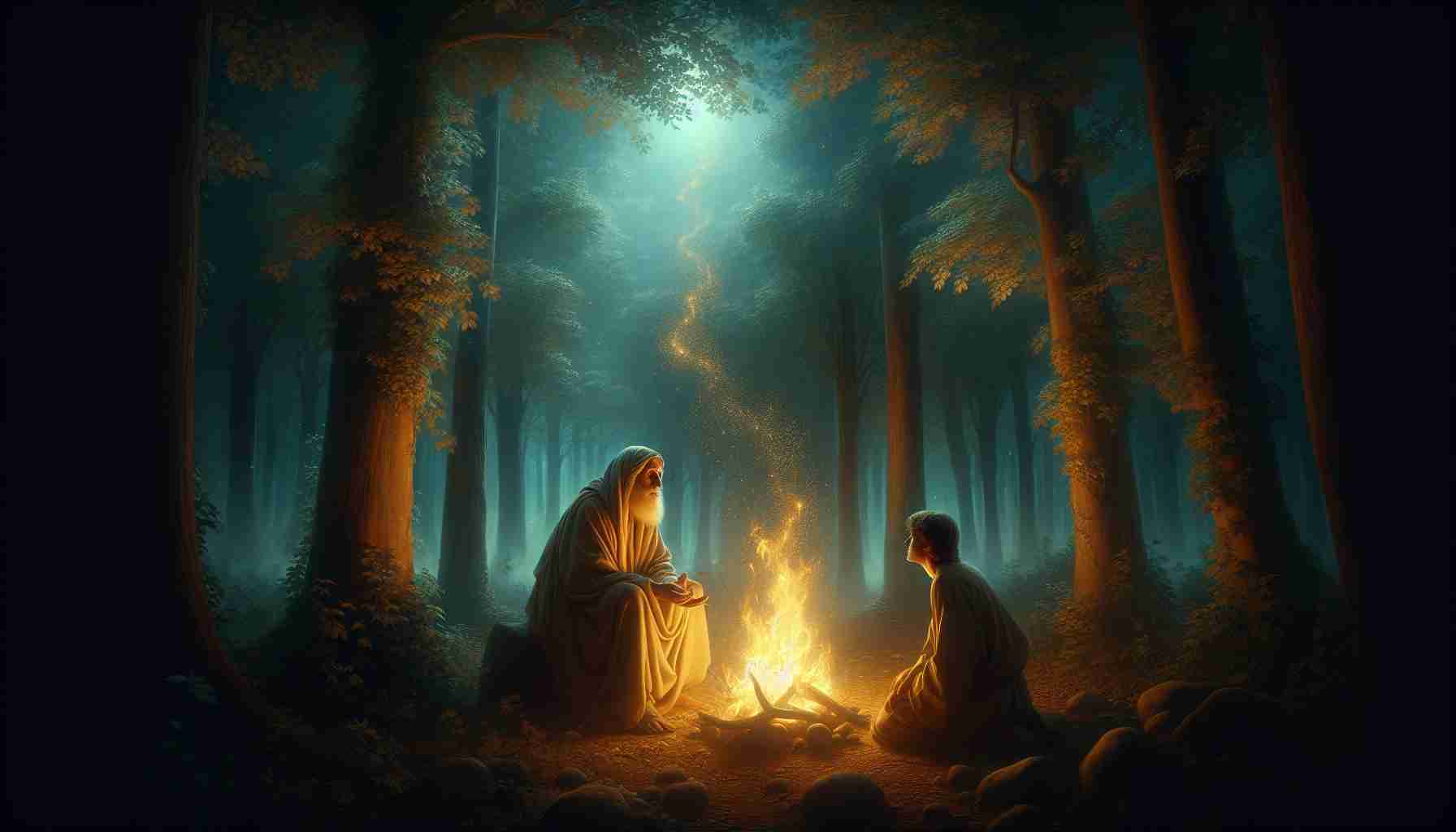

The fire flickered, but it did not burn. That’s the part I’ll never forget.
I was a young man back then, full of plans and pride. My name was Wei, and I believed that if I worked hard enough and pushed long enough, I could shape the world my way. I rose early, trained harder than others, and even tried to control every moment of my day. “A man must bend the world to his will,” my father always said. And I believed him.
One autumn morning, I left my village to climb the Silent Peak. They said a hermit lived up there—a man who had not spoken in years but whose eyes held answers. I wanted to ask him how to win faster. How to gain more. My boots scratched the dirt as I climbed, leaves crunching underfoot. The path twisted, and my thoughts swirled. What if I fail? What if I’m not enough?
By sunset, I found him.
He was sitting by a small fire in a stone circle, wrapped in a thin robe. His gray beard reached his chest. The fire gave no smoke, and though it danced bright and hot, it warmed nothing. I stepped forward. “Wise one, how do I become strong? How can I make my life go the way I want?”
He did not speak. He simply looked at me, then at the fire.
I waited, kneeling in the dust. Minutes passed. I huffed. “Don’t you hear me? I need help. I’ve tried everything—working, forcing, never stopping.”
Still, silence.
Finally, he lifted a small branch and dropped it into the flame. It didn’t burn. It glowed—almost like it was becoming light itself—but no smoke came. I stared, unsure what I was seeing.
Then, his voice finally came, soft as wind through reeds.
“The flame that does not burn is still a flame.”
I blinked. That was it?
Frustrated, I said sharply, “I don’t understand!”
He looked at me then, deeply. “You try to burn through life. But some things glow brighter when left alone. You force the Tao where you should follow it.”
And then I saw. The fire didn’t need to burn to be alive. Like the sun that rises without shouting. Like water that moves around rocks instead of smashing them.
I stayed with him that night. We didn’t talk. We didn’t need to. In the morning, I left without asking more.
On the way down, I didn’t hurry. I didn’t think ahead to what I must do next. I just stepped when it was time to step.
Now, many years later, I still think of that fire.
I didn’t stop working or striving—but I no longer push the river. I float. I listen. Some things are meant to happen. Others, meant to pass.
That day, I learned about Wu Wei—non-action that isn’t lazy but wise. I learned the Tao flows, even when I don’t try to shape it.
And sometimes, the brightest light is the flame that doesn’t burn.
The fire flickered, but it did not burn. That’s the part I’ll never forget.
I was a young man back then, full of plans and pride. My name was Wei, and I believed that if I worked hard enough and pushed long enough, I could shape the world my way. I rose early, trained harder than others, and even tried to control every moment of my day. “A man must bend the world to his will,” my father always said. And I believed him.
One autumn morning, I left my village to climb the Silent Peak. They said a hermit lived up there—a man who had not spoken in years but whose eyes held answers. I wanted to ask him how to win faster. How to gain more. My boots scratched the dirt as I climbed, leaves crunching underfoot. The path twisted, and my thoughts swirled. What if I fail? What if I’m not enough?
By sunset, I found him.
He was sitting by a small fire in a stone circle, wrapped in a thin robe. His gray beard reached his chest. The fire gave no smoke, and though it danced bright and hot, it warmed nothing. I stepped forward. “Wise one, how do I become strong? How can I make my life go the way I want?”
He did not speak. He simply looked at me, then at the fire.
I waited, kneeling in the dust. Minutes passed. I huffed. “Don’t you hear me? I need help. I’ve tried everything—working, forcing, never stopping.”
Still, silence.
Finally, he lifted a small branch and dropped it into the flame. It didn’t burn. It glowed—almost like it was becoming light itself—but no smoke came. I stared, unsure what I was seeing.
Then, his voice finally came, soft as wind through reeds.
“The flame that does not burn is still a flame.”
I blinked. That was it?
Frustrated, I said sharply, “I don’t understand!”
He looked at me then, deeply. “You try to burn through life. But some things glow brighter when left alone. You force the Tao where you should follow it.”
And then I saw. The fire didn’t need to burn to be alive. Like the sun that rises without shouting. Like water that moves around rocks instead of smashing them.
I stayed with him that night. We didn’t talk. We didn’t need to. In the morning, I left without asking more.
On the way down, I didn’t hurry. I didn’t think ahead to what I must do next. I just stepped when it was time to step.
Now, many years later, I still think of that fire.
I didn’t stop working or striving—but I no longer push the river. I float. I listen. Some things are meant to happen. Others, meant to pass.
That day, I learned about Wu Wei—non-action that isn’t lazy but wise. I learned the Tao flows, even when I don’t try to shape it.
And sometimes, the brightest light is the flame that doesn’t burn.